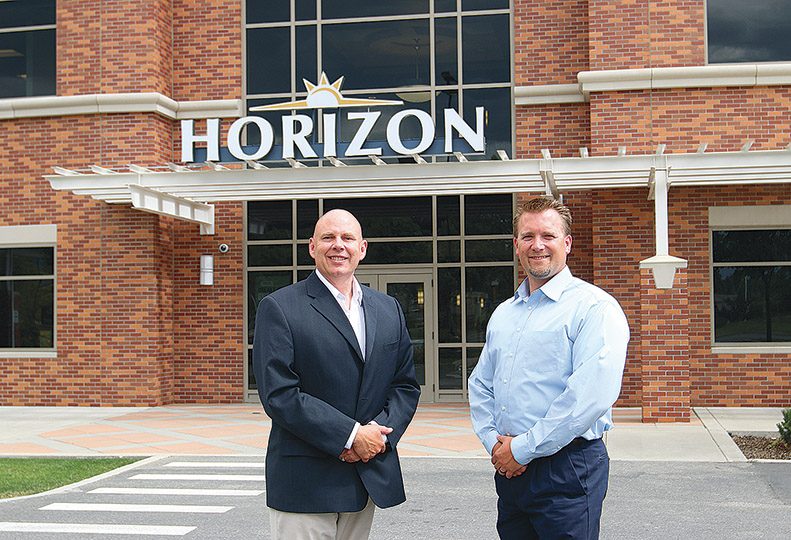
Home » Horizon Credit Union's focus on footprint
Horizon Credit Union's focus on footprint
Credit union's total assets approaching $600 million

June 19, 2014
Spokane Valley-based Horizon Credit Union has substantially expanded its charter since it was established 67 years ago and has absorbed a couple of other credit unions in recent years, contributing to solid membership, loan, and asset growth.
Founded as Kaiser Aluminum Employees Federal Credit Union in 1947, the cooperative association today has 18 branches in Washington, Idaho, and western Montana, with nearly 60,000 members in the three states. Those numbers include operations added during a merger with Montana First Credit Union, in Missoula, in 2012 and a recent merger with EDTECH Credit Union, of Butte, Mont.
The credit union’s total assets as of Dec. 31, 2013, were $584 million, up from $531 million at the end of 2012, says Jeff Adams, Horizon’s CEO. It reported total loans of $460 million as of the end of 2013, up from $393 million a year earlier. Horizon’s net income in 2013 was $4.2 million, up from $2.9 million in 2012.
Adams attributes substantial growth in the past year to loan growth and mortgage refinancings.
“Business got better as we started to climb out of the recession in 2012 and 2013, and consumers began purchasing more autos, boats, and RVs,” Adams says. “We had fewer charge-offs, and we completed the Missoula merger, so we didn’t have those one-time expenses in 2013.” Adams says the credit union’s total loans grew by nearly 18 percent last year.
Horizon Credit Union’s main office is located at 13224 E. Mansfield in Spokane Valley, and it operates two additional Spokane-area offices at 355 E. Third and 9861 N. Nevada. Horizon employs a total of about 230 people, including 145 in the Spokane area. Twelve employees were added in the EDTECH Credit Union merger.
Last year, Horizon began offering members new e-services, including mobile check deposit and a feature that enables members to transfer funds to other people or institutions more easily online, Adams says.
“These have quite literally taken off,” he says, “We reached over $1 million in mobile check deposits by April 2013.”
The credit union also launched a new mortgage servicing product enabling it to service home loans at Horizon’s locations rather than other banks.
“We are retaining the largest segment of those mortgages and not selling them to secondary markets,” Adams says. “We have had rapid adoption of all of our online services and people always want the next big thing.”
This year, Adams says, Horizon has also been offering new credit card products.
“We have a split-rate credit card and other offers allowing members to structure their credit cards to their needs,” he says. He says it also offers a balance transfer credit card with low or no-interest payments.
Credit unions measure what is called net-worth ratio, which is determined by dividing the institution’s net worth by total assets. The National Credit Union Administration says a credit union must have a net-worth ratio, also called a net-capital ratio, of at least 7 percent to be considered in good financial health.
Horizon’s net ratio is currently 10.5 percent, Adams says, which is down from 11.7 percent in 2012. He says the ratio fell due to the credit union’s rapid growth during 2013, and that Montana First Credit Union’s net ratio was lower than Horizon’s ratio.
The credit union has experienced many milestones during its nearly seven decades of operation, Adams says. In 1966, its assets were $2 million, and a short time later, the institution underwent a series of charter expansions that enabled it to offer services to Kaiser Trentwood Industrial Park employees. Its name changed in 1991 from Horizon Federal Credit Union to Horizon Credit Union when it converted from a federal to a state-chartered institution.
Also in the 1990s, Horizon Credit Union merged with Inland Power & Light Credit Union and Lincoln County Electric Credit Union, and opened branches in Deer Park and Davenport. In 2002, Horizon’s charter was expanded to include the state of Washington and anyone who lives, works, or worships in any school district in the state.
In 2004, the credit union merged with Mountain View Credit Union and was granted an eight-county charter for expansion in North Idaho. Two years later, Horizon expanded again by merging with Columbia Basin Federal Credit Union, adding three additional branches in Moses Lake and Ephrata, bringing the credit union’s assets to $330 million and its total membership base to 30,000. In 2012, it partnered with Montana First Credit Union adding two more branches in Missoula, Mont.
Currently, Horizon is awaiting regulatory approval on the EDTECH Federal Credit Union merger, which is expected in the next several weeks. The credit union is working on data-processing details with the two most recently acquired credit unions and mapping out products that are similar to one another to combine services it offers members. After the approval, EDTECH will be renamed Horizon.
Adams says Horizon will be holding town hall meetings for EDTECH Federal Credit Union members during coming weeks in Butte, to apprise members of upcoming changes. Management teams from both credit unions will be on hand to provide information and answer questions. New services for EDTECH members include online deposit capture, bank-to-bank transfer capability, and Federal Housing Administration (FHA), Veterans Affairs (VA) and United States Department of Agriculture (USDA) mortgages.
For Horizon customers, there won’t be any differences in products or services due to the merger.
In terms of growth for the credit union, Adams says Horizon will continue to expand its regional footprint and is looking at small to medium-sized markets to do so, focusing for now on western Montana.
Latest News Special Report Banking & Finance
Related Articles
Related Products

![Brad head shot[1] web](https://www.spokanejournal.com/ext/resources/2025/03/10/thumb/Brad-Head-Shot[1]_web.jpg?1741642753)

